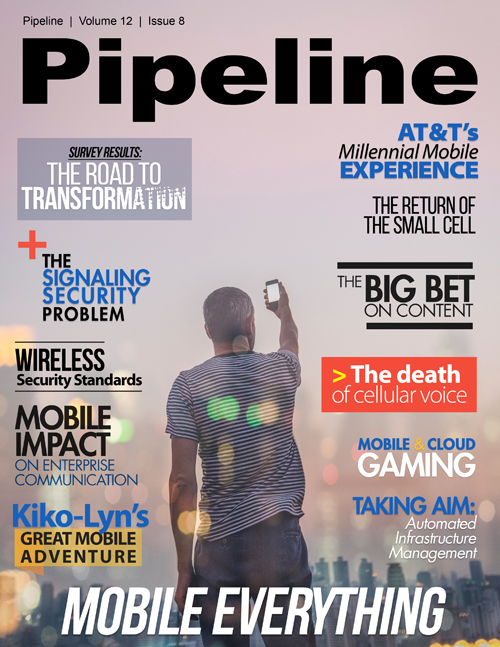Monthly News Digest - February 2016
Now that EE is safely tucked into BT’s pocket, the newly-expanded service provider is looking at developing joint ventures with Deutsche Telekom -- now BT’s largest shareholder after the EE acquisition. Analysts hint at a move to all IP networks for the two major European carriers as DT takes a 12 percent stake in BT and, in an ironic turn of efforts, may be looking to now acquire the primarily-fixed-line U.K. telecom as BT expands into TV, mobile (with its takeover of EE), and ultra-fast broadband.
Closer to home, Ericsson announced it was acquiring U.S. entertainment content provider FYI Television in a move to expand the Swedish communication technology and service provider’s content discovery business from Europe to the rest of the world. Ericsson claims to be the largest provider of content discovery services in Europe and intends to make its business global with the addition of FYI.
Just to the north, Canada’s Zayo Group Holdings Inc. completed its acquisition of Manitoba Telecom Services Inc. subsidiary Allstream for CAD $465 million. The move adds trans-Canada routes and dense metro networks to Zayo’s portfolio and makes the company the only pan US/Canada network provider.
No rest for the FCC
The Federal Communications Commission was busy all month with a number of telecommunications issues, ranging from what to do with legacy systems to where and how fast telecom services should be.
AT&T spent a lot of face time with the FCC, arguing points about dumping outdated services and getting rid of copper. The carrier giant has petitioned the FCC to discontinue what it considers obsolete services such as collect-calling and other operator-assisted offers that have declined sharply over the past decade. In a separate filing, the company sided with competitor Verizon to oppose TelePacific’s proposal to the FCC asking for a delay in the retirement of copper infrastructure. TelePacific cited possible diminished services to customers who may not have access to IP networks. However, AT&T asserts that providers – including TelePacific -- already have sufficient time to inform their business customers that they might be switching away from copper.
Speaking of AT&T and the FCC, all of this activity has made the FCC realize it needs to modernize its communications – so it turned to AT&T for some help. The carrier has signed a five-year agreement with the FCC to provide it with a cost-effective IT solution supporting secure mobile and cloud-based applications. The service will link a number of offices and data centers and let the FCC change network and Internet needs on demand. Using AT&T’s services, the FCC can connect to diverse cloud service providers.
In its effort to modernize, the FCC may have become too aggressive, says six senators. According to a letter written to the commission, Senators Daines (R-MT), Wicker (R-MS), Blunt (R-MO), Fisher (R-NE), Johnson (R-WI) and Gardner (R-CO) expressed their concern that the commission has set an overly ambitious benchmark for broadband internet speeds. The senators called the speed requirement, which last year changed broadband download speeds from 4 mbps to a minimum of 25 mbps, “arbitrary” and said it “fails to accurately capture what most Americans consider broadband.”
In other FCC news, the commission has wrapped up the special-access data-collection proceedings it had undertaken to better understand competition in the special-access market, where services are provided to carriers enabling voice and data traffic to be transported from cell phone towers and buildings. Sprint took the deadline to submit comments as an opportunity to complain about the high wireless backhaul fees charged by incumbent local exchange carriers (ILECS), claiming they are unreasonable and will only drive up wireless costs for consumers.
FCC chairman Tom Wheeler just announced a proposal to unlock set-top boxes from cable and satellite subscriptions to enable consumers to use their preferred devices for accessing programming, saying it would open up the industry to more choice and innovation. In response, MVPD advocacy group The Future of TV Coalition released a "fact sheet" rebutting the FCC's assertions, saying the commission's proposal is based on "myth," not "reality."
Finally, with the warming up of US relations with Cuba, the FCC has announced that the last remaining country on its exclusion list is now officially open for US companies to provide telecommunications services without separate commission approval. The commission went on to say that removing Cuba from its exclusion list benefits the public interest as it will likely alleviate administrative and cost burdens on both telecom companies and the FCC and fuel more competition among carriers interested in the new market.
To read more news stories, be sure to check our Pipeline’s real-time news center and subscribe to Pipeline’s weekly and month newsletters.
To have your company’s news included in our coverage, send your press releases to pressreleases@pipelinepub.com for consideration.

















